This at-home lab test with virtual care consultation provides valuable insights into your core health markers (heart, liver, kidney, and more) for proactive disease prevention.
-
16 biomarkers measured
-
CLIA-certified and CAP-accredited lab
-
Finger prick sample
-
Fasting
-
Virtual Care Included
What is measured?
This test measures the following biomarker:
-
HbA1c
HbA1c is a measure of your blood sugar levels over the last ninety days. When elevated, HbA1c is used to diagnose diabetes and pre-diabetes and can help your healthcare provider to manage diabetes and prediabetes by tracking what your levels are doing over time.
-
eAG
The EAG test or Estimated Average Glucose test is a calculation of your average blood glucose level over the previous 90 days. It is based upon the HbA1C blood test and helps predict blood sugar levels over time and provides insight into how well your blood glucose levels are managed over time.
-
Creatinine
Creatinine levels in the bloodstream are crucial indicators of kidney function. Creatinine, a natural waste product, accumulates in the blood when kidneys are not functioning properly. Routine testing during physical examinations helps diagnose kidney diseases and accurately assess kidney function.
-
eGFR
Estimated glomerular filtration rate (eGFR) measures kidney function by estimating how well the glomeruli of the kidneys filter waste from the blood. A higher eGFR indicates better kidney function. Values below 60 suggest kidney disease or compromised kidney function, while values below 15 indicate kidney failure. eGFR levels need to be interpreted based upon an individual's relative muscle mass. Individuals who have very high muscle mass may have a lower eGFR and individuals who have very low muscle mass may have a higher eGFR. Regular eGFR testing helps to monitor kidney health and guide treatment decisions.
-
AST
AST is an enzyme that is mainly found in the liver, but is also found in the heart, muscles, and kidneys. When any of these organs is damaged, AST levels rise in the blood. This test enables evaluation of liver function. Elevated AST levels can indicate problems with the liver such as liver disease, infectious hepatitis or toxicity related to medications, alcohol use, or other environmental toxins.
-
ALT
ALT (alanine aminotransferase) is an enzyme primarily found in the liver and in the kidneys, heart, and muscles. It has a role in amino acid metabolism. When elevated, ALT indicates damage to the liver such as hepatitis, cirrhosis, liver cancer, or reaction to medications. Elevated ALT can also indicate damage to other tissues, though it is less common. When ALT levels are higher than AST levels, it can be used to diagnose conditions such as Non-Alcoholic Fatty Liver Disease (NAFLD).
-
Cholesterol
Cholesterol is a lipid that is found in the blood. It comes from food that you eat and is also manufactured in the liver. Cholesterol is a fatty substance essential for building cells and producing many hormones. When levels are elevated, excess cholesterol is deposited into the blood vessels and is associated with heart disease and stroke.
-
HDL
High density lipoprotein (HDL) is often referred to as the "good" cholesterol. It removes LDL ("bad cholesterol") from your arteries and takes it to the liver where it is metabolized or broken down into bile acids and excreted from the body in the bile. Elevated HDL is generally considered protective against heart disease and stroke, however extremely high levels can also be problematic. Low levels increase risk of heart attack and stroke due to buildup of excess LDL in the blood vessels.
-
LDL
Low density lipoprotein (LDL) is often referred to as the "bad" cholesterol. It is produced in the liver and is deposited into the tissues where it is used to build cell membranes and hormones. Elevated LDL comes from your genetics and your diet. Eating saturated and trans fats will increase LDL levels. When oxidized, LDL is deposited into the arteries where it creates plaque and contributes to heart disease and stroke. Low LDL is associated with inflammation and increased risk of cancer and mood disorders.
-
Triglycerides
Triglycerides are a type of fat found in the bloodstream. Triglycerides are produced by the body from the food we eat and are also stored in fat cells for later use as energy. While triglycerides are essential for normal body function, high levels can increase the risk of heart attack and stroke. Extremely elevated levels are associated with pancreatitis, metabolic syndrome and type 2 diabetes.
-
LDL/HDL ratio
The LDL/HDL ratio measures the balance between low-density lipoprotein (LDL) cholesterol, or "bad" cholesterol, and high-density lipoprotein (HDL) cholesterol, or the "good" cholesterol. This ratio provides a more comprehensive assessment of your cardiovascular risk than individual cholesterol levels alone. A higher ratio indicates a greater risk of heart disease and stroke. Elevated LDL levels contribute to plaque buildup in the arteries while higher HDL levels help remove cholesterol from the bloodstream.
-
Cholesterol/HDL ratio
The CHOL/HDL ratio is a measurement derived from dividing the total cholesterol (CHOL) level by the high-density lipoprotein (HDL) cholesterol level. This ratio helps assess cardiovascular risk, as a higher ratio indicates a greater risk of heart disease, while a lower ratio suggests a lower risk.
-
VLDL
VLDL is a type of lipoprotein made by the liver. VLDL is composed of a protein, cholesterol and triglyceride molecule combined together. VLDL is transported to the body and blood vessels where triglycerides are removed from the VLDL leaving an LDL cholesterol molecule. At high levels, VLDL can contribute to the buildup of plaque in the arteries leading to heart disease, and stroke.
-
TSH
Thyroid-Stimulating Hormone (TSH) is a hormone produced by the pituitary gland that regulates the function of the thyroid. TSH controls the production of the thyroid hormones thyroxine (T4) and triiodothyronine (T3), which are essential for maintaining metabolism, energy levels, and overall hormonal balance. TSH is one test that is used to diagnose thyroid disorders such as hypothyroidism (underactive thyroid) or hyperthyroidism (overactive thyroid), Graves' disease, and Hashimoto's thyroiditis, and to monitor the effectiveness of thyroid treatment.
-
hsCRP
hsCRP is a marker of inflammation and risk of heart disease and stroke. hsCRP is elevated with inflammation in autoimmune diseases, infection, smoking, obesity, high carb and high processed food diets, and with cardiovascular diseases. hsCRP is one of the most sensitive, simple and affordable tests to determine your risk of cardiovascular diseases such as heart attack and stroke; even when you have no symptoms. Even very slight increase in hsCRP levels above normal can increase your risk of heart attack and stroke.
-
Vitamin D
The Vitamin D test measures the level of 25-hydroxyvitamin D and is the most accurate indicator of your vitamin D status. Vitamin D enables absorption of calcium and phosphorus, which is essential for maintaining strong bones and preventing conditions like osteoporosis and rickets. Adequate vitamin D levels support kidney function by helping regulate calcium balance and may have a protective effect on cardiovascular health by contributing to normal heart function and managing inflammation.
Who should take this test?
This test is suitable for anyone 18+ who wants to:
- Get a comprehensive picture of your heart health, diabetes risk, liver function, and immune system strength
- Manage a health condition. This test helps track progress and helps you stay on top of their health goals
- Have irregular menstrual cycles or concerns about ovulation or hormonal imbalances
- Identify potential health risks for chronic diseases early on, allowing to take preventive measures for a healthier future
How to test?
Before you begin:
- Fast overnight for 12 hours and take the test in the morning.
- When you wake up, drink 12oz. of water and collect your blood sample 1 hour later.
- Avoid smoking for 1 full hour before collecting your blood sample.
- Wash your hands with soap in warm water, and then rub them together.
- Do some light exercise, like jumping jacks, to increase blood circulation.
Register your test ID online and collect your sample:
Scan the QR code inside your kit and follow the instructions to collect your sample.
After collection:
- Let your sample dry completely on card (2 hours).
- Mail test box the same day using the prepaid label. If you take your test on Sunday, mail it in first thing on Monday.
Pre-Testing Video
What is in the box?
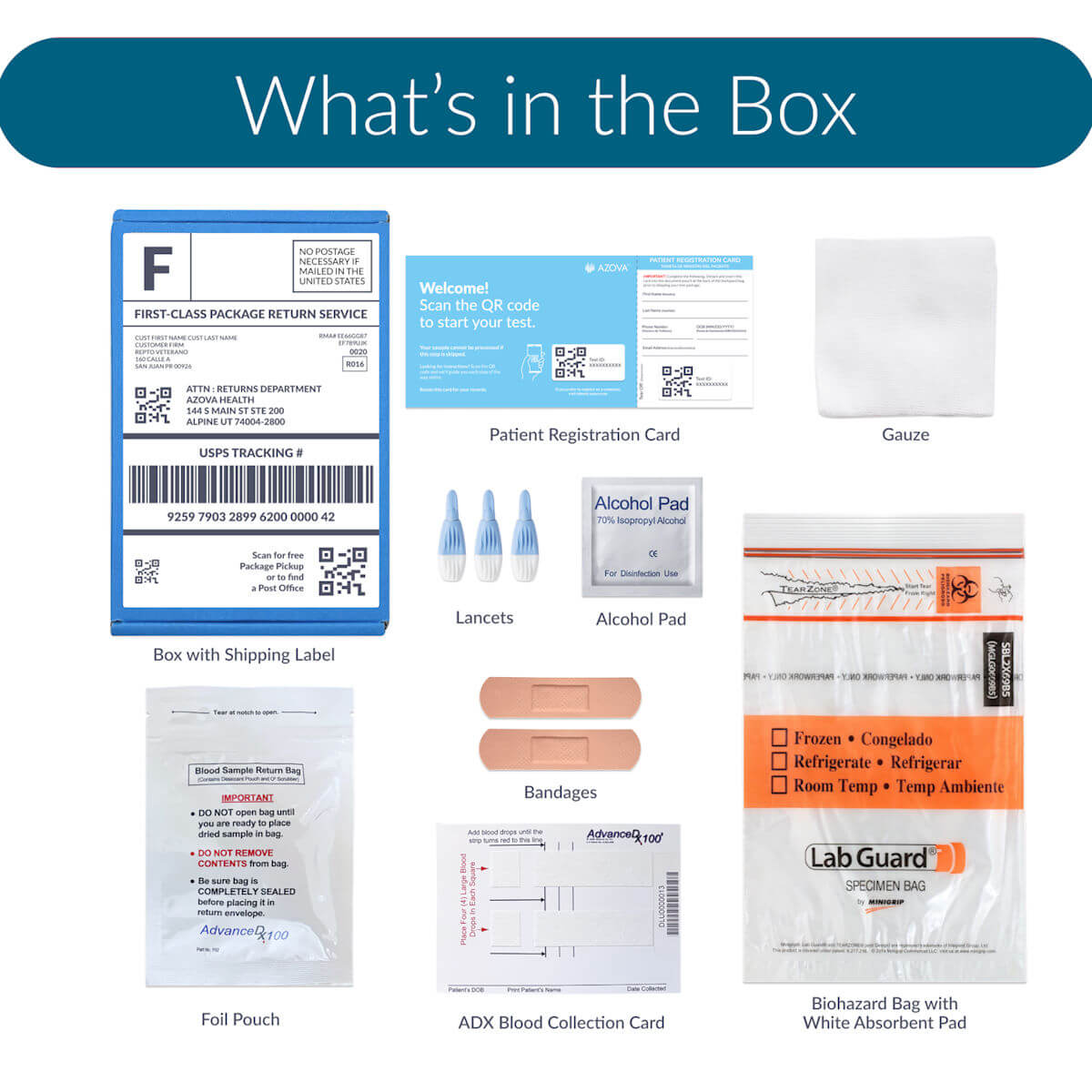
What to expect?
- Prepaid shipping label and packaging for an easy return to the lab
- All the necessary materials for sample collection
- Live 24/7/365 proctoring to guide you through the sample collection process
- Easy-to-follow video directions to help you along the way
- Digital (and printable) results found in the AZOVA app
The HEALTHBOX™
Virtual Preventive Exam
Virtual Preventive Exam
2-5 days
Couldn't load pickup availability
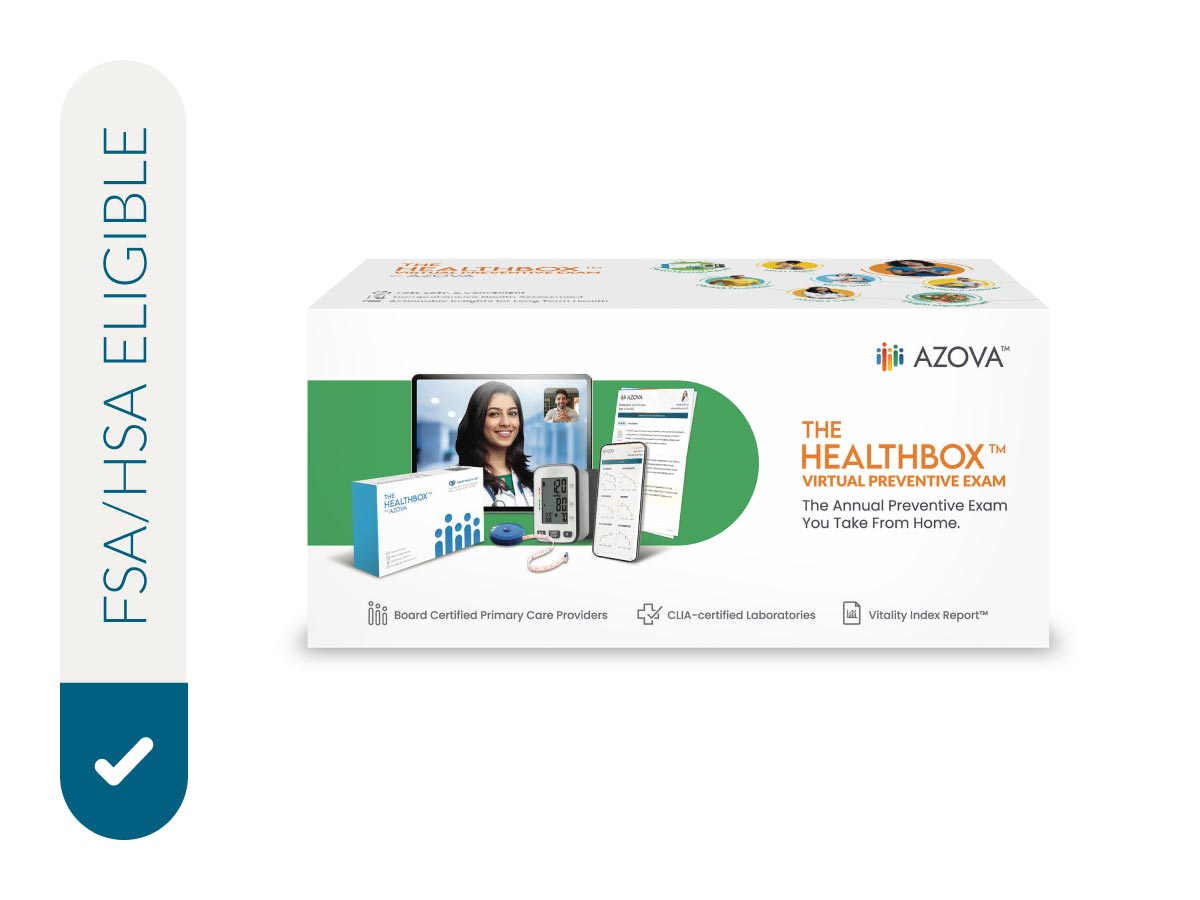
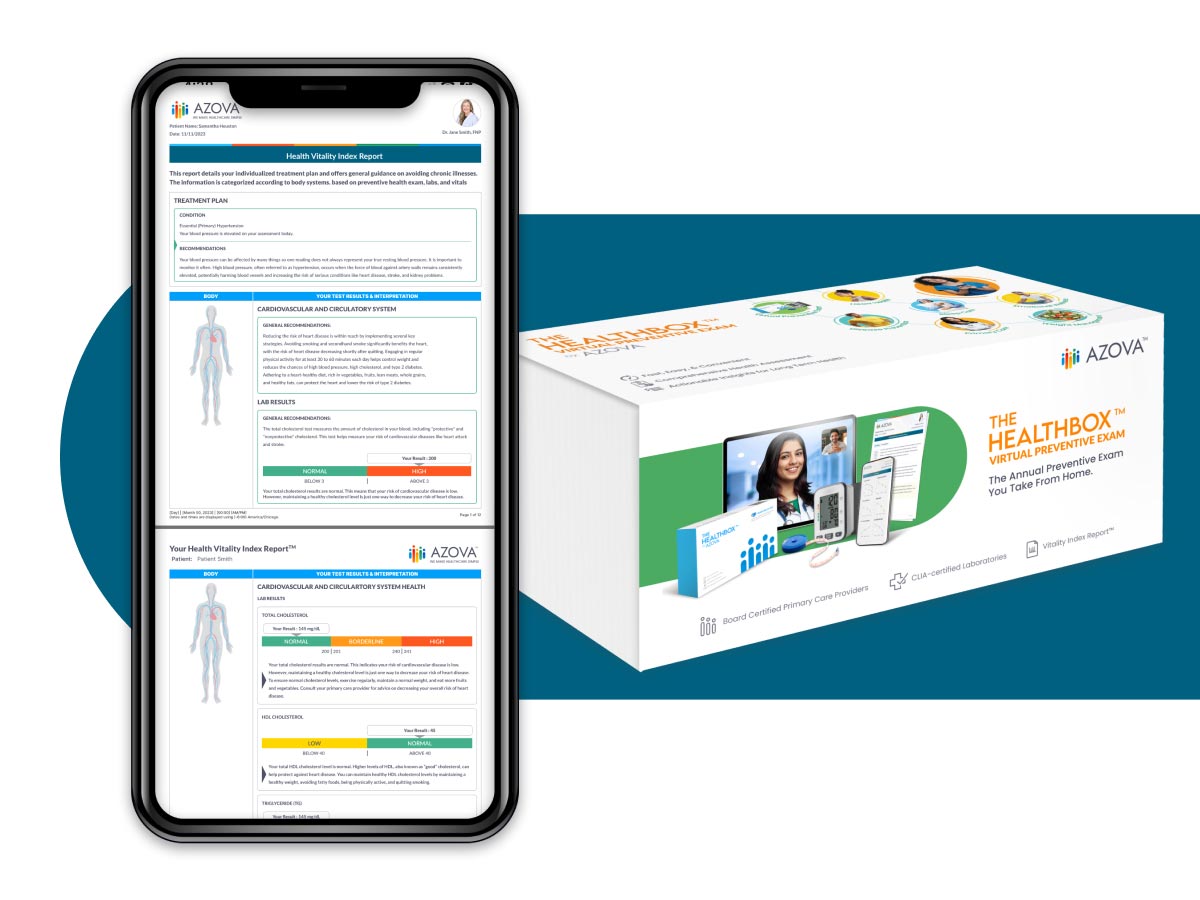
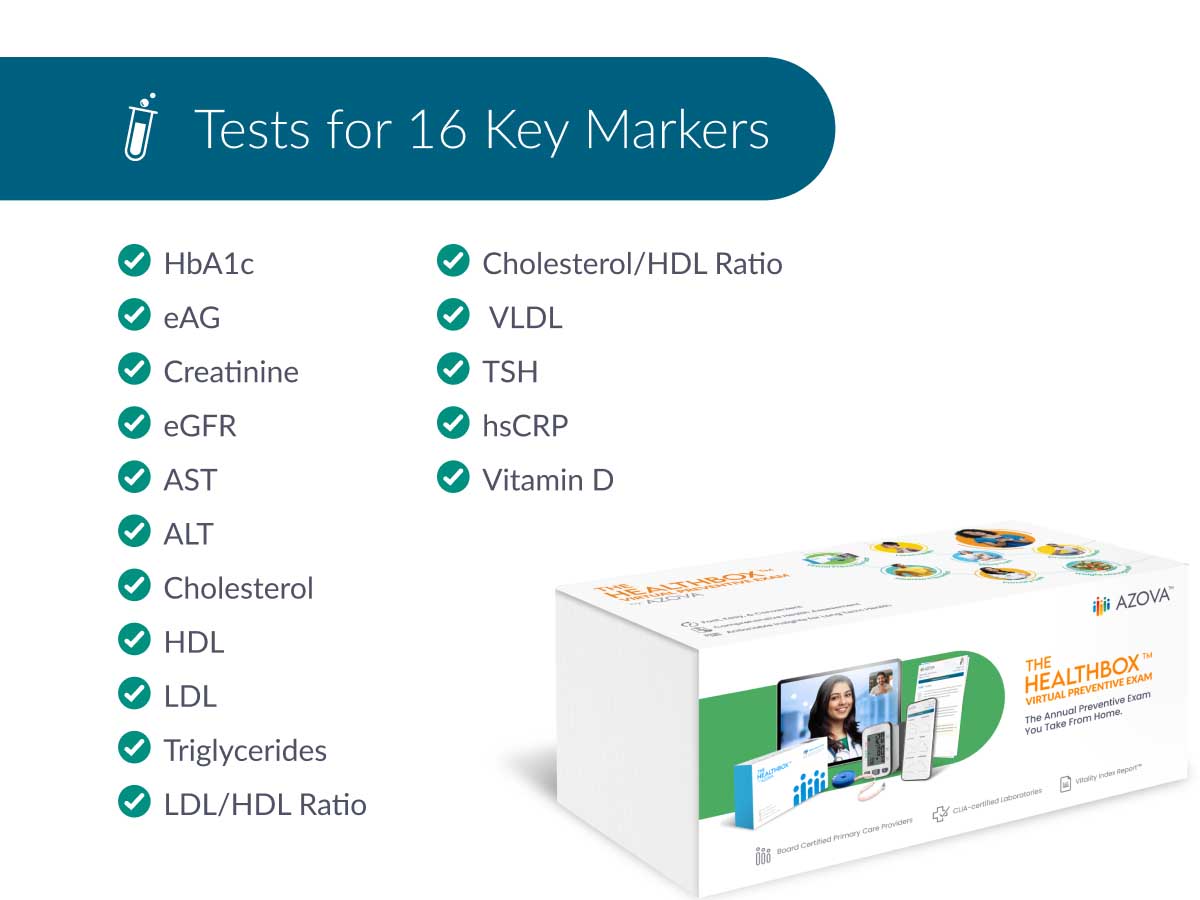
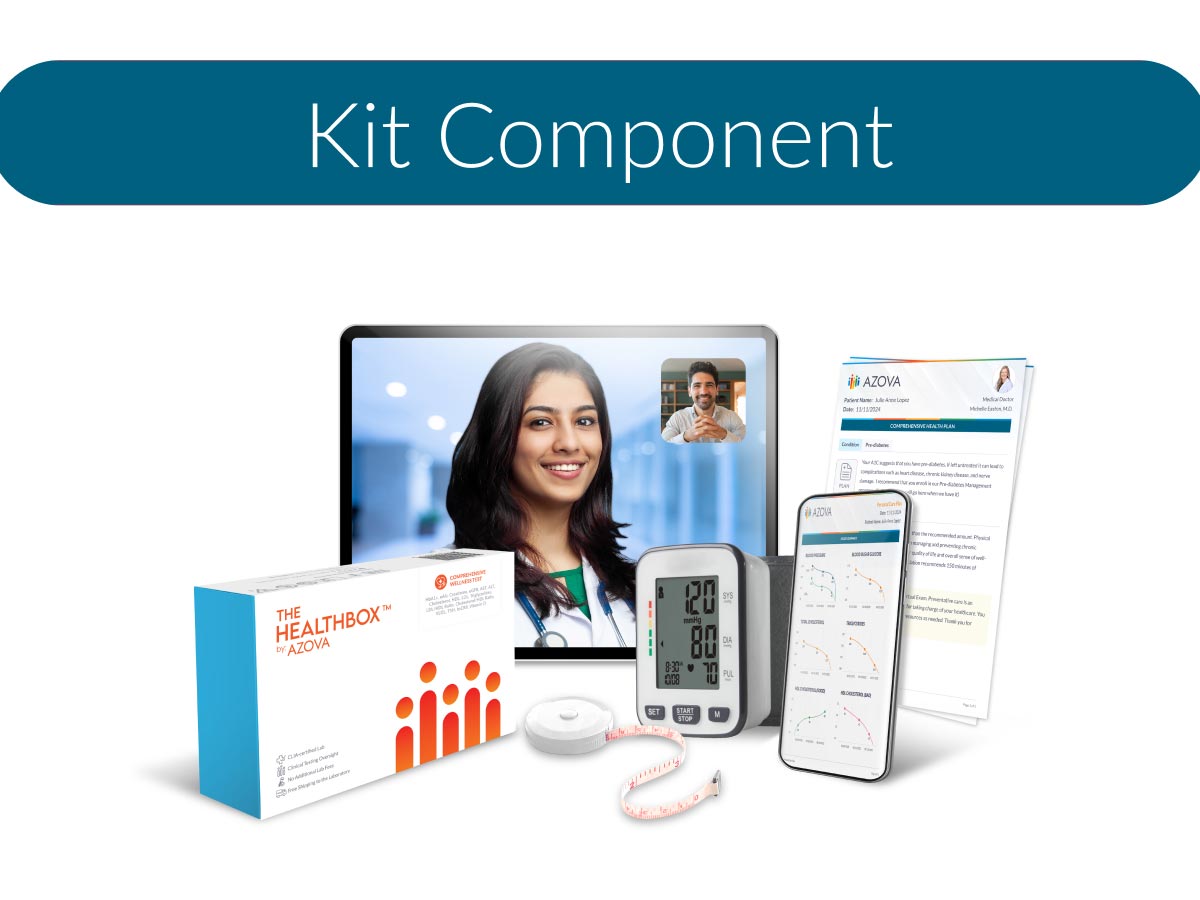
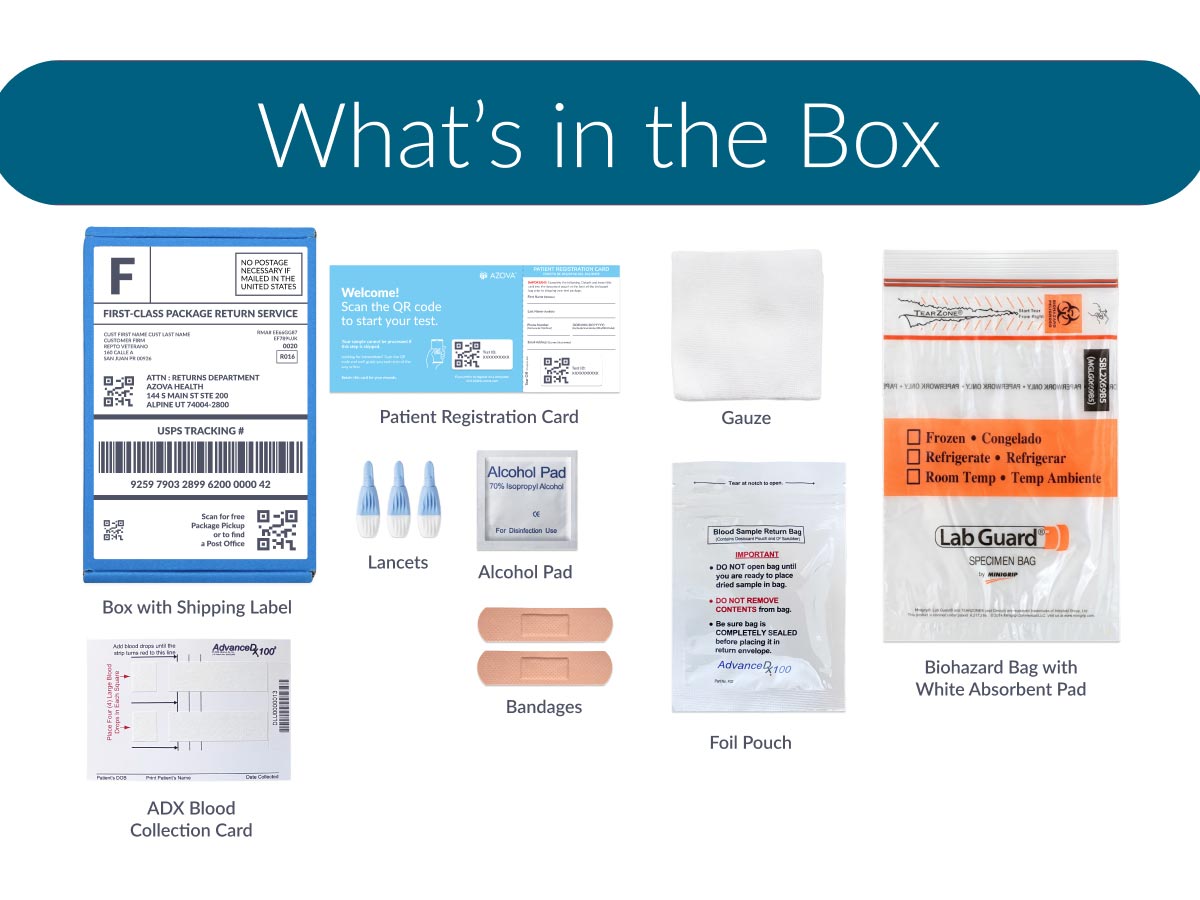
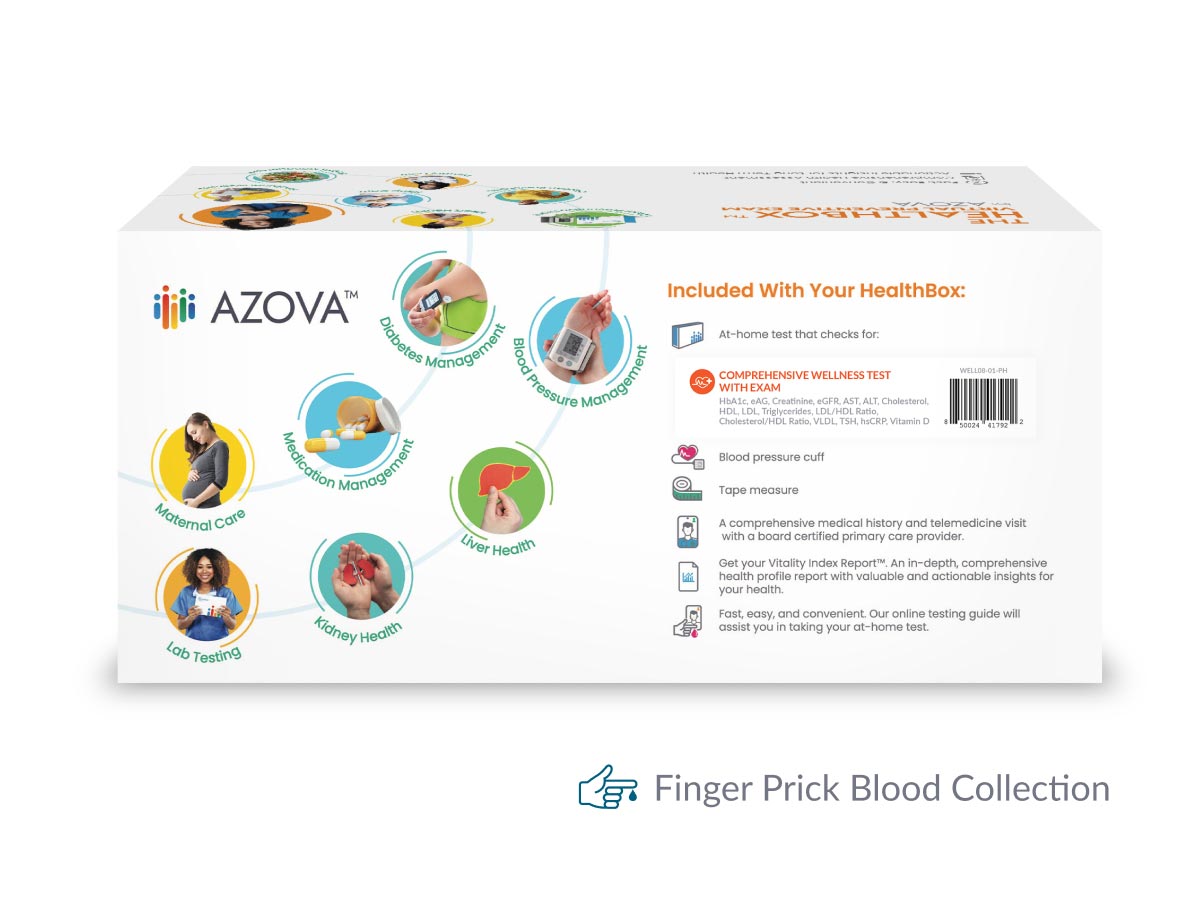
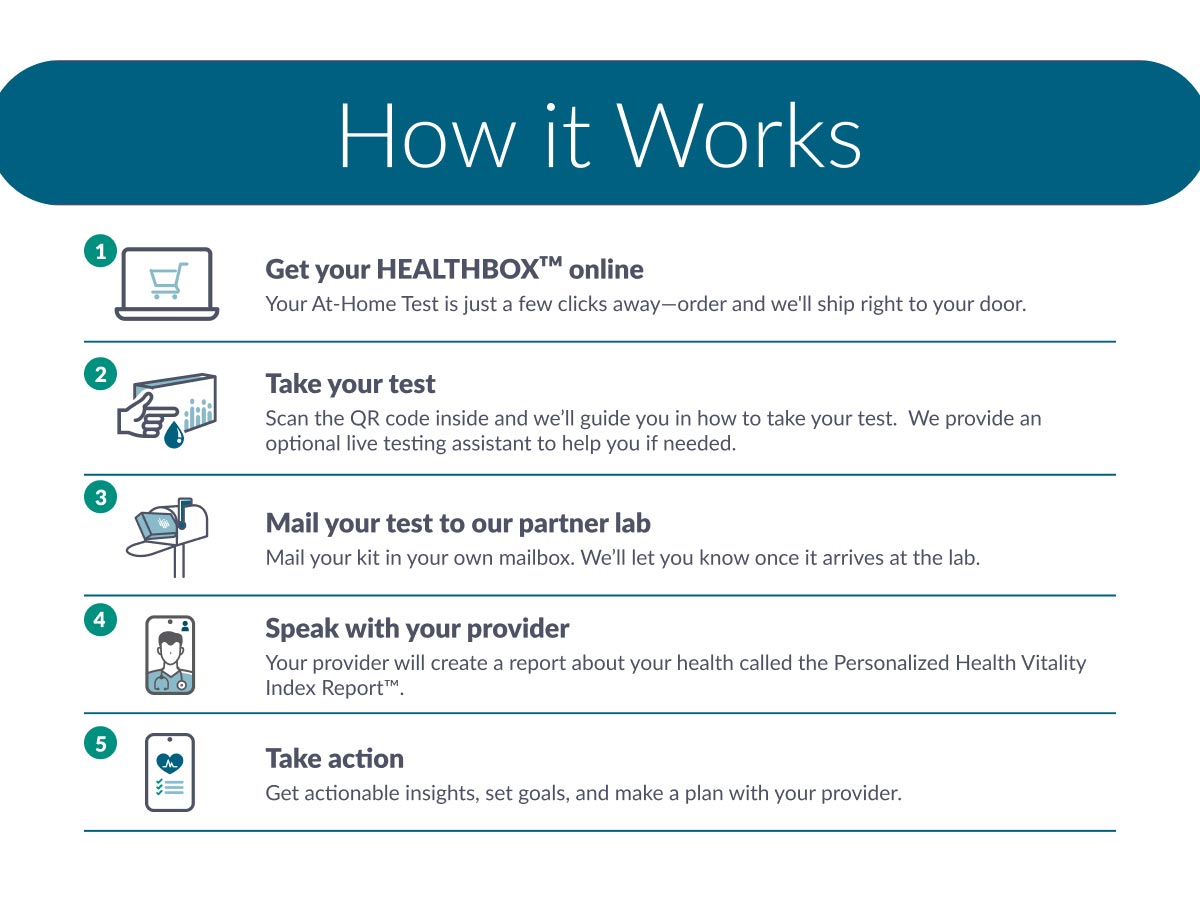
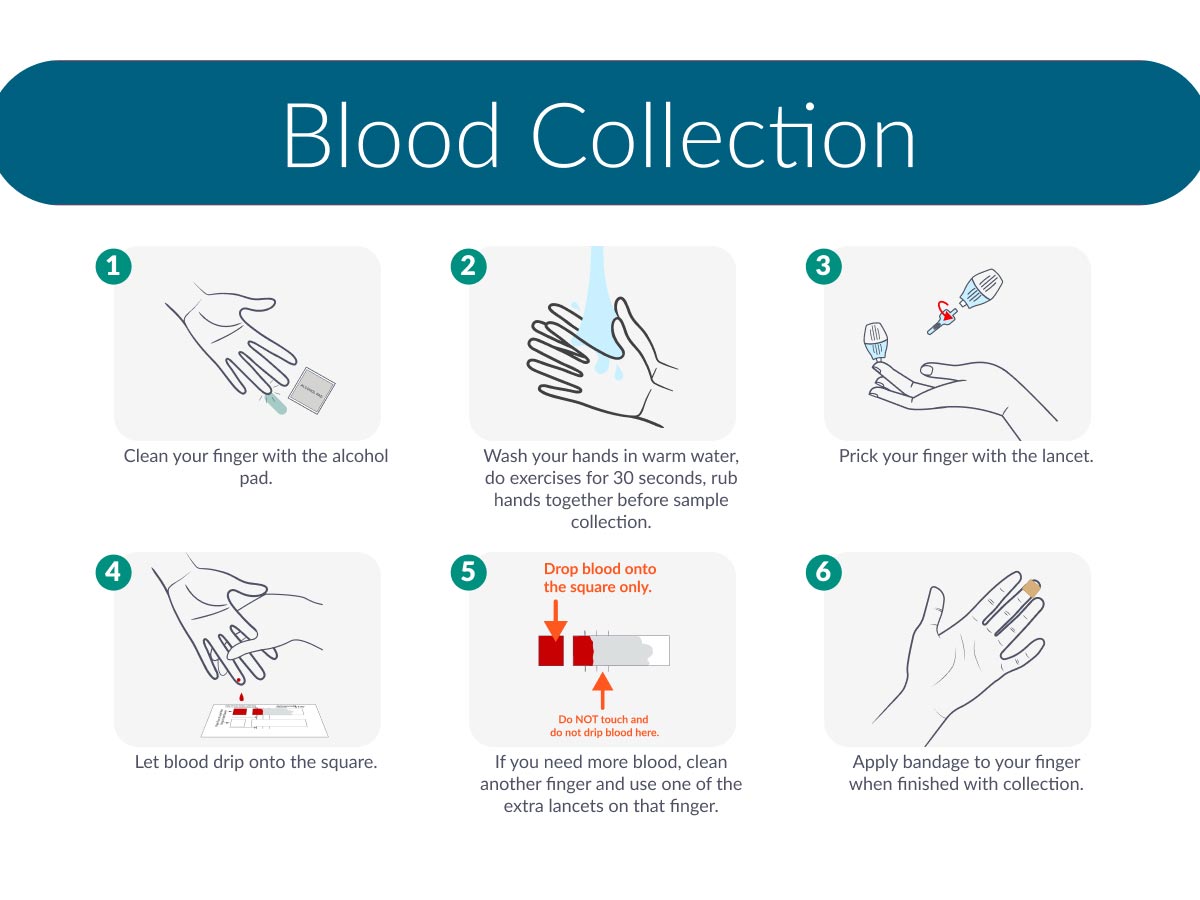
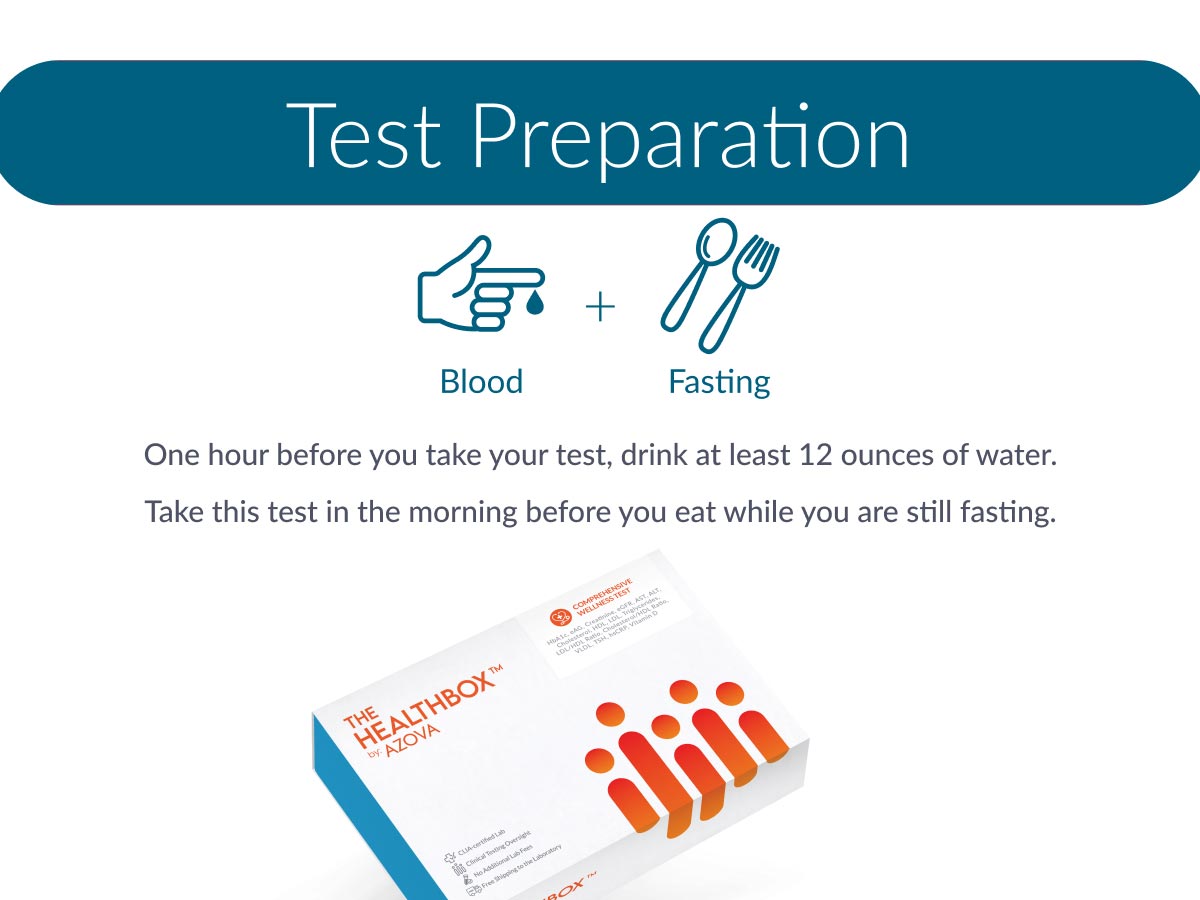
How it works
-
1
Collect your blood sample at home.
Fast and easy sample collection either with our online testing guide or virtual proctoring service.
-
2
Mail your sample to a CLIA-certified and CAP accredited lab.
You’ll receive an SMS and email notification when your sample arrives
-
3
Receive your results electronically.
Complete with a digital report that is printable in the AZOVA app.
-
4
Take action on your results.
Access our educational materials and get an included virtual care visit with a certified health provider.
Frequently asked questions
Are AZOVA tests covered by FSA/HSA?
- Use your AZOVA test order confirmation to submit for FSA/HSA reimbursement.
- As defined by the IRS, many FSA/HSA benefits coordinators consider AZOVA tests to be qualified medical expenses.
- However, some FSA/HSA benefits coordinators might deny reimbursement. Before purchasing, please consider checking with your benefits coordinator to see if your FSA/HSA covers AZOVA products.
Who should take this test?
- Men and women (18+):
Gain insights into heart, diabetes, liver, immunity, thyroid, and more - Monitor chronic conditions:
Track progress and stay on top of health goals - Proactive wellness:
Identify potential health risks early for a healthier future
What if I have questions about this test or my results?
For questions about your test or results, contact AZOVA Customer Support at 844-692-9682, available 24/7.
For a more in-depth discussion of your results with a healthcare provider, AZOVA's Virtual Care is available at azova.com for an additional cost.
How often should I take this test?
Take this test once a year. Test more frequently if you are monitoring a chronic condition to ensure you stay on top of your health needs effectively.
In which states can I purchase this test?
Tests are available for individuals 18 years and older and require a blood sample. Availability of tests may vary by state. Visit azova.com/states for more information. This test is only intended for informational and educational use, and is not intended to be used for diagnostic purposes.
Purchase, registration, and use are subject to the AZOVA User Agreement available at azova.com/patient-terms.
Information presented here is not intended to diagnose or treat any condition and is provided for educational purposes only. Always consult with your healthcare provider before making any healthcare decisions.
If you are having a life threatening emergency, please call 911 immediately.
It's easy and quick to do with reliable results. Why take time to go to the doctor when you can do it at home and get quicker results.


Talk with Customer Support
You can call AZOVA’s Customer Support team for comprehensive support, including help with your account, testing, results and telemedicine visits.
Please note that wait times may vary depending on call volume.
(844) 692–9682









